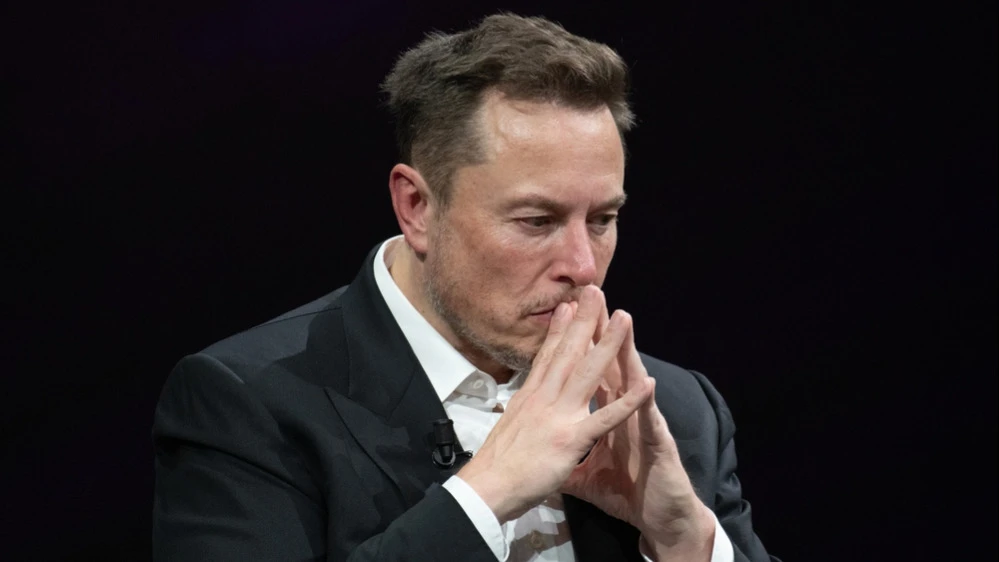Shorts will make $1.4 billion on Tesla stock collapse over Musk's idea to form a party
"We'd like to see Musk's efforts focused on launching robot cabs, not on electoral ambitions," said William Blair analyst Jed Dorsheimer

Downside traders could earn about $1.4 billion in "paper profits" on Tesla's stock collapse, predicted Reuters. The company's shares collapsed nearly 7 percent on Monday due to investor concerns about CEO Ilon Musk's political ambitions: he announced the formation of a new political party in the United States. Market participants worry that Musk will once again distract from the company's affairs, as he did during his time in the White House administration.
Details
Shares of Tesla at trading on Monday, July 7, decreased by 8.4% at the moment, and ended the day down 6.8% - to $293.94, which was the lowest closing price for the month. The collapse could prove beneficial for investors playing down: they could lock in about $1.4 billion in "paper" profits (that is, unrealized while positions remain open), wrote Reuters, citing data from analyst firm Ortex. It used a $296 share price for its calculations.
This is the second successful case for shorts in just over a month. On June 5, they made more than $4 billion on the paper in a single day: Tesla shares then posted the largest drop in a single day of trading - after the conflict between CEO Ilon Musk and U.S. President Donald Trump turned into an open confrontation on social media.
The fortune of Ilon Musk -the world's richest businessman- dropped by $12 billion to $393.1 billion on July 7 due to a drop in Tesla shares, Forbes calculated. Despite this, Musk remained at the top of the Forbes Real-Time rankings, which are updated in real time based on quotes. Musk is separated from second-place Oracle Chairman Larry Ellison by $117.2 billion.
Why the stock collapsed
Tesla shares plummeted after Musk announced the creation of a new political party in the U.S.: this raised investor concerns about the billionaire's involvement with the company, Reuters writes. Musk's decision was another twist in his public conflict with Trump after the businessman renewed his criticism of Trump's budget and tax initiatives - the "great and wonderful law" that the president signed on July 4. Trump called Musk's decision to form a party "ridiculous" and noted that the businessman has "gone completely off the rails, turning into a real disaster."
Musk's political move comes just days after Tesla for the second consecutive quarter reported a drop in shipments, with the decline the steepest in the company's history and shares down 35% relative to a record set in December 2024, reported Reuters. Tesla's stock is the worst performer this year in the "Magnificent Seven" tech giants, the agency added.
"I and any other Tesla investor would prefer to stay out of the political business. The sooner this distraction is removed and Tesla gets back to real business, the better," stated Camelthorn Investments advisor Sean Campbell, who owns Tesla stock, told Reuters.
What the analysts are saying
Investors don't like the Tesla CEO's political activism, Wedbush's Dan Ives, Wall Street's chief optimist on Tesla, acknowledged Sunday.
"The fact that Musk is moving deeper into politics and now trying to challenge the Washington establishment is exactly the kind of direction [of activity] that Tesla investors and shareholders don't want at all," he wrote in a note that is quoted by Forbes.
William Blair analyst Jed Dorsheimer on Monday downgraded Tesla's securities from Outperform ("above market") to Neutral, also noting the negative effect of Musk's political activities.
"We believe investors are growing weary of distractions - especially at a time when the company needs Musk's focus more than ever. His next foray into politics promises only risks. We'd like to see Musk's efforts focused on launching robotaxis rather than on electoral ambitions," Dorsheimer wrote in a note that is cited by CNBC.
The analyst also pointed out that the "big and beautiful" law not only removes tax breaks for buying electric cars, but also eliminates penalties for automakers for failing to meet carbon emission quotas. For Tesla, those allowances are an important source of revenue: its cars have no carbon footprint, so it sells its allowances to other automakers.
"If the elimination of the electric vehicle tax credit hits demand, the decline in revenue from regulatory credits will hit profitability directly, and investors will have to rethink all [company valuation] models," noted Dorsheimer.
Tesla recorded its worst declines in deliveries in the first and second quarters of 2025, JPMorgan noted in a Forbes story. Analysts at the investment bank called it a worrying trend and said 2025 could be the company's worst year for shipments since 2022. JPMorgan recommended selling shares of the electric car maker (Sell rating). Earlier, the bank rated the securities as "below market" (Underweight).
Context
According to data from the Silver Bulletin portal, 55% of Americans have a negative view of Elon Musk. 37% of respondents speak positively about him, and another 8% are undecided. For comparison: at the end of last year, 45% viewed Musk negatively. And the decline in sympathy is noted among Democrats, Republicans and independent voters, writes Forbes.
This article was AI-translated and verified by a human editor
